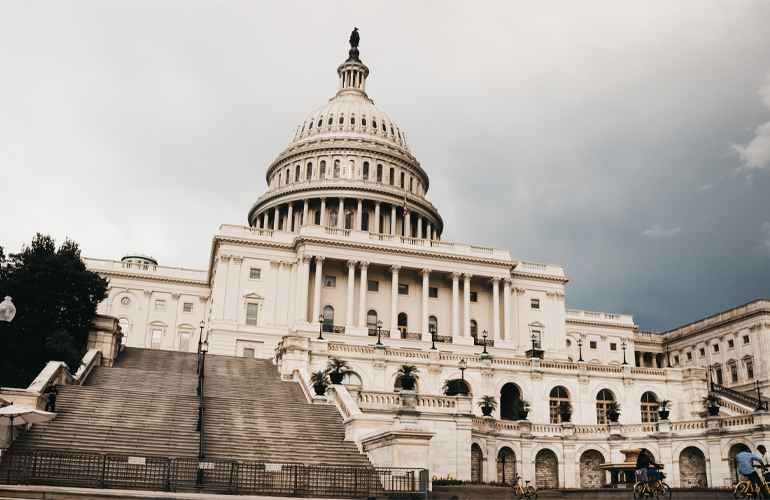
The U.S. House of Representatives on Friday, Feb. 28, passed H.R. 2339, a bill that would ban nationwide sales of all flavored tobacco and vaping products, with few exceptions, as well as outlaw any remote sales not done face-to-face, effectively doing away with online purchases of any kind.
The House bill’s ban on flavors includes menthol and applies not only to vaping products, but to all tobacco products, including smokeless or chewing tobacco as well as cigars. So called “premium” cigars – defined by the bill as any item costing no less than $12.00 – are exempt from the ban.
“HR 2339 is government overreach that will deprive retailers and legal age adults the right to sell and purchase legal tobacco products,” said Tom Briant, executive director of the National Association of Tobacco Outlets (NATO).
While supporters touted the legislation’s aim is to curb the use of vape products among children under 18, critics also pointed out that the federal minimum age to purchase restriction of 21 has been in effect for only two months, which is not enough time to measure it’s success in keeping tobacco and vape products out of the hands of minors.
“U.S. lawmakers should allow the new federal legal (purchase) age of 21 to work to further reduce underage youth access to tobacco products along with the recent enforcement actions by the FDA to remove certain cartridge-based and pod-based electronic cigarette products from the market,” Briant said.
Bill Probably Dead for This Session
The bill now moves to the U.S. Senate, where it is unlikely to be taken up by the Republican-controlled body. The White House issued a statement saying that, should any joint bill reach President Trump’s desk, his advisers will counsel him to veto the measure.
“Well, I mean, it’s not going anywhere in the Senate, so it’s not going to be enacted,” said Lyle Beckwith, senior vice president of government relations at the National Association of Convenience Stores. “It’s a dangerous precedent that it passed the House. Because in 10 months, we could have a Democratic Senate. This was sort of a marker put in there. I would note that they had a lot of difficulty at the end, getting it passed.”
Democrats Frank Pallone of New Jersey and Donna Shalala of Florida introduced the bill nearly a year ago as the “Reversing the Youth Tobacco Epidemic Act.” Pollone is chairman of the House Energy and Commerce Committee.
“We’re very gratified at how much resistance the bill did get,” noted Beckwith. “I think, I don’t know, but my sense is that Chairman Pollone was surprised at how much resistance the bill got and how hard they had to work.”
The measure passed by a vote of 213-195. Of the representatives voting in favor of the measure, 208 Democrats were joined by five Republicans. Seventeen Democrats joined 177 Republicans voting against the bill, as did one independent. Not voting on the bill were 22 lawmakers, 15 Republicans and 7 Democrats.
Critics say that if a similar bill actually cleared both houses and was then signed into law, the measure would seriously hurt the vaping industry. Others say that vaping offers a less harmful alternative to cigarette smoking and hampering the industry would remove that option from those adults who have made the switch from tobacco.
The House version requires the FDA to extend regulations on tobacco products to include all vape products, including e-cigarettes. The bill further prohibits non-face-to-face retail sales, which would effectively ban online sales of tobacco products, including electronic nicotine delivery systems (ENDS); and prohibits the use of flavored ENDS products, except if approved by the FDA.
Legal Retailers Fear Bootleg Trade
There is also the fear that a flavor ban would fuel business to underground tobacco sources while undermining law-abiding retail outlets
“NATO is concerned that HR 2339 will have a significant negative impact on retailers that sell tobacco products while also encouraging an illicit market in flavored tobacco products,” said Briant.
NACS’ Beckwith agreed. “Our legal customers now are going to the illicit trade to buy the products they want to buy, instead of buying legally from us,” he said, noting that menthol cigarettes account for around 30% of the cigarette market. “This bill was a stimulus package for the illicit trade, and we told Congress that.”
The law also requires the FDA to implement regulations to require color graphics on the labeling of cigarette packages, depicting the negative health consequences of smoking, as well as regulates products containing synthetic nicotine.
One of the strong objections to the House bill from the vaping industry is the increase in user fees it calls for the FDA to collect from vaping product manufacturers. The fees – estimated to be around $100M – would push prices up. Critics say that few of the of the smaller, independent vape makers will be able to remain viable if the new regulations are implemented.



